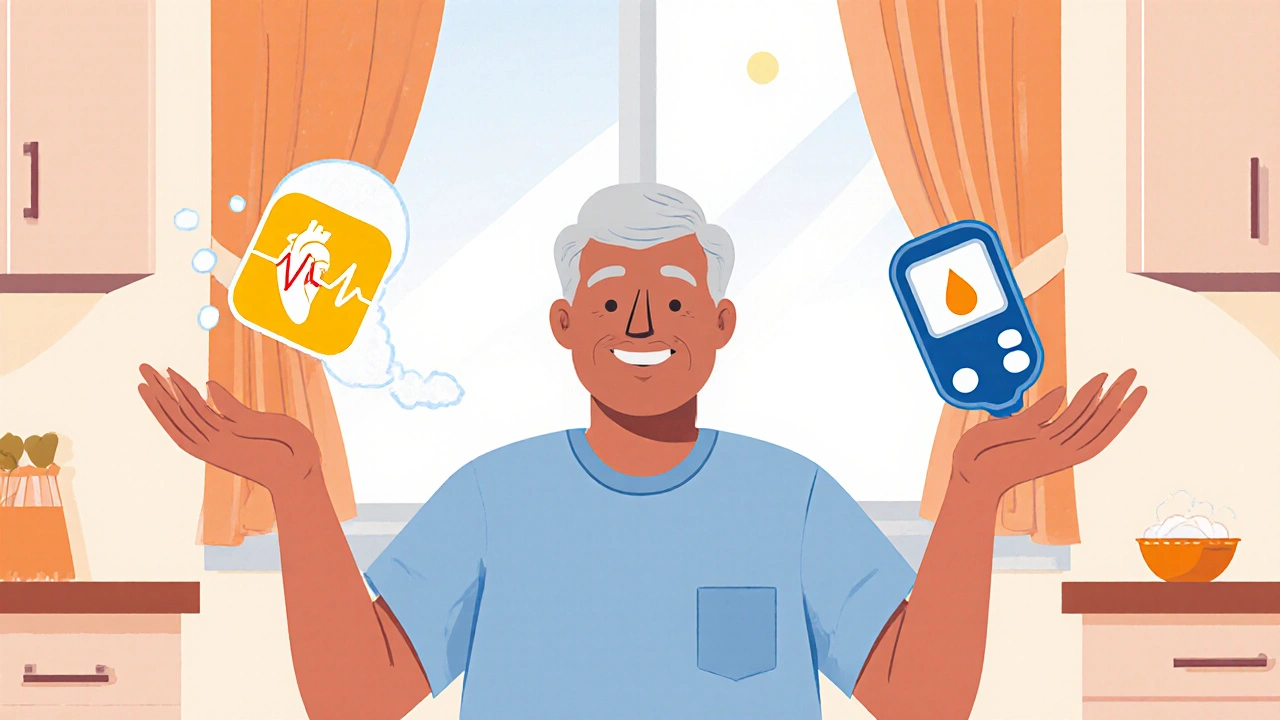Managing Atrial Fibrillation When You Have Diabetes: A Complete Guide

AF-Diabetes Stroke Risk Calculator
Stroke Risk Assessment
This tool estimates your stroke risk based on atrial fibrillation and diabetes factors. Use this information to discuss prevention strategies with your healthcare provider.
Stroke Risk Assessment
Living with both atrial fibrillation is a common heart rhythm disorder that causes an irregular and often rapid heartbeat and Diabetes is a chronic condition where the body struggles to regulate blood sugar levels can feel like juggling two demanding jobs at once. One condition can worsen the other, and the treatment plan for each may clash. This guide walks you through the science, the meds, and the everyday habits that keep both conditions in check, so you can focus on staying active and feeling better.
Why Atrial Fibrillation and Diabetes Often Walk Hand‑in‑Hand
Research from the American Heart Association (2023) shows that people with diabetes are 40 % more likely to develop atrial fibrillation (AF) than those without. High blood sugar damages the heart’s electrical system, while insulin resistance fuels inflammation-a perfect storm for AF triggers. On the flip side, AF can worsen glucose control by reducing exercise capacity and increasing stress hormones that spike blood sugar.
Key Risks When Both Conditions Co‑exist
When AF and diabetes overlap, three major risks jump to the forefront:
- Stroke: AF raises stroke risk three‑fold; diabetes adds another 20‑30 %.
- Heart failure: The irregular rhythm strains the heart, and diabetes‑related vascular disease makes recovery harder.
- Poor glycaemic control: Medications for AF can affect insulin sensitivity, while fluctuating glucose levels can provoke AF episodes.
Understanding these links helps you and your clinician choose the safest, most effective treatment mix.
Medication Strategies That Keep Both Conditions Friendly
Choosing drugs for AF when you have diabetes is a balancing act. Below are the most common medication families, how they work for each condition, and what to watch out for.
| Medication | Primary AF Effect | Impact on Diabetes | Typical Dose | Key Monitoring Point |
|---|---|---|---|---|
| Warfarin | Vitamin K antagonist - reduces clot formation | Neutral; may interact with some diabetes drugs | 2-5 mg daily, adjusted to INR 2-3 | INR checks & potential hypoglycaemia if diet changes |
| Direct Oral Anticoagulants (DOACs) | Target specific clotting factors (e.g., Xa, IIa) | Generally safe; dose may need reduction with renal impairment | Apixaban 5 mg BID (adjust for weight/renal) | Renal function every 6‑12 months |
| Beta‑Blockers | Slow heart rate, control rhythm | Can mask hypoglycaemia symptoms; monitor blood sugar closely | Metoprolol 50‑100 mg daily | Heart rate & glucose logs |
| Calcium‑Channel Blockers | Control ventricular response in AF | May raise blood glucose slightly | Diltiazem 120‑240 mg daily | Blood pressure & glucose checks |
| Metformin | First‑line diabetes drug; neutral on AF | Improves insulin sensitivity; may reduce AF burden | 500‑1000 mg BID | Lactic acidosis risk with renal decline |
| SGLT2 Inhibitors | Diabetes drug with proven heart‑failure benefit | Reduces AF incidence in some studies; watch for dehydration | Empagliflozin 10 mg daily | Kidney function & hydration status |
Key take‑aways:
- Anticoagulants are non‑negotiable for stroke prevention; DOACs are often preferred for easier monitoring.
- Beta‑blockers control rate but require vigilant glucose tracking.
- Choosing diabetes drugs with cardiovascular benefits (Metformin, SGLT2 inhibitors) can indirectly help AF control.
Lifestyle Tweaks That Benefit Both Hearts and Sugar
Medication alone won’t keep you on track. Lifestyle changes create a supportive backdrop for both conditions.
- Exercise wisely: Aim for 150 minutes of moderate‑intensity aerobic activity per week (e.g., brisk walking, cycling). High‑intensity bursts can trigger AF in sensitive individuals, so keep the intensity steady.
- Mind your diet: Follow a Mediterranean‑style plan rich in leafy greens, nuts, olive oil, and fish. Limit refined carbs and sugary drinks to keep HbA1c below 7 %.
- Weight management: Even a 5‑% body‑weight reduction can lower AF recurrence by 30 % and improve insulin sensitivity.
- Limit alcohol and caffeine: Both can precipitate AF episodes; aim for no more than one drink per day and moderate caffeine intake.
- Stress reduction: Techniques like deep breathing, yoga, or short walks lower cortisol, which helps stabilise heart rhythm and blood sugar.
Regular Monitoring: What to Track and How Often
Consistent data helps your healthcare team fine‑tune therapy.
- Heart rhythm: Use a wearable ECG monitor or periodic Holter checks, especially after medication changes.
- Blood sugar: Check fasting glucose daily if on insulin, otherwise 2‑3 times a week. Keep a log of any episodes of palpitations.
- Kidney function: Crucial for dosing DOACs and SGLT2 inhibitors; test eGFR every 6 months.
- Blood pressure: Target <130/80 mmHg; uncontrolled pressure fuels both AF and diabetic complications.
Bring these readings to every appointment; they form the backbone of an integrated care plan.
Special Situations and Common Pitfalls
Some scenarios need extra attention.
- Renal impairment: Adjust anticoagulant dosage and avoid metformin if eGFR falls below 30 ml/min/1.73 m².
- Hypoglycaemia unawareness: Beta‑blockers can mask warning signs. Pair them with continuous glucose monitoring (CGM) if you’ve had severe lows.
- Catheter ablation: For refractory AF, ablation can be safe in diabetics, but ensure tight glucose control before and after the procedure to reduce infection risk.
Putting It All Together: A Practical Checklist
- Confirm you’re on an appropriate anticoagulant; prefer a DOAC unless contraindicated.
- Review diabetes meds - prioritize Metformin and SGLT2 inhibitors for heart benefit.
- Schedule regular ECG, HbA1c, and kidney‑function labs.
- Adopt a Mediterranean diet, stay active, and monitor weight.
- Limit alcohol, caffeine, and manage stress.
- Keep a shared log of heart‑rate spikes and glucose readings for your doctor.
Following this roadmap can trim the risk of stroke, keep your heart beating regularly, and make blood‑sugar swings less likely. Talk with your cardiologist and endocrinologist together - coordinated care is the best defense.
Can I take insulin and blood thinners together?
Yes. Insulin does not interfere with anticoagulants. However, watch for low blood sugar, especially if you’re on beta‑blockers that may hide symptoms.

Are DOACs safer than warfarin for diabetics?
Generally, DOACs need less monitoring and have fewer food‑drug interactions, making them a convenient choice for many patients with diabetes. But kidney function still matters.
What lifestyle change reduces AF episodes the most?
Weight loss is the biggest factor. Losing just 5‑10 % of body weight can cut AF recurrence by up to one‑third.
Should I stop my SGLT2 inhibitor before heart surgery?
Your surgeon will likely ask you to pause it 24‑48 hours before the operation to avoid dehydration and rare ketoacidosis.
How often do I need an ECG if I have both conditions?
At least once a year, or sooner if you notice palpitations, dizziness, or any change in symptoms.
9 Comments
hema khatri
Wow, handling AF and diabetes feels like a marathon-keep pushing forward!
Jennell Vandermolen
Tracking your glucose and rhythm side by side can really shine a light on patterns; a simple logbook helps you and your doc see what triggers spikes or palpitations. Pair that with regular check‑ups on kidney function and you’ll stay ahead of the curve. Also, keep your meds schedule tight-small slips can throw off both heart and sugar control. Remember, consistency is the quieter hero in this battle.
Mike Peuerböck
It is paramount to align anticoagulation with glycaemic management, lest one undermine the other; thus, selecting a DOAC with renal‑sparing properties while maintaining metformin can synergistically curtail thrombotic risk and improve insulin sensitivity. Vigilant monitoring of INR or renal indices, complemented by periodic ECG recordings, furnishes a comprehensive safety net. Moreover, integrating SGLT2 inhibitors not only safeguards cardiac output but also mitigates volume depletion that could precipitate arrhythmia. In sum, a harmonized pharmacologic orchestra yields a resilient cardiovascular and metabolic performance.
Simon Waters
Many people don’t realize that hidden inflammation can push both diabetes and AF higher. Keeping blood pressure low and avoiding excess salt also eases the heart’s workload.
Kajal Gupta
Yo, swapping out those sugary sodas for sparkling water with a splash of lemon can do wonders for your sugar spikes and keep the heart chill. Toss in a weekly yoga session, even if it’s just 20 minutes, and you’ll notice the palpitations easing up. Also, try snacking on almonds instead of chips – the healthy fats help stabilize glucose and give your heart some love.
Zachary Blackwell
Honestly, the mainstream guidelines conveniently ignore how big pharma pushes certain anticoagulants that aren’t truly renal‑friendly, all while the hidden research shows natural anti‑inflammatory diets could replace them. If you dig into the data, you’ll see a pattern of suppressed studies that highlight diet‑based interventions. Trust your own body’s signals and ask for independent labs before buying into the cookie‑cutter prescriptions.
prithi mallick
It’s fascinating how the mind‑body connection mirrors a philosophical dance between choice and destiny; when you decide to replace that soda, you’re not just cutting sugar, you’re reshaping the narrative of our health. Even a small shift in diet can echo through the circulatory system, reminding us that every bite is a verb in the story of our heart. Keep exploring, and remember that mistakes are just stepping stones toward wisdom.
Michaela Dixon
When one delves into the interconnected web of atrial fibrillation and diabetes, it becomes evident that lifestyle is the fulcrum upon which both conditions balance, and thus a systematic overhaul can produce ripple effects far beyond the immediate metrics of HbA1c or heart rate variability. First, consider the temporal pattern of meals; spacing carbohydrate intake evenly across the day prevents sudden glucose surges that can provoke sympathetic activation, which in turn may trigger ectopic beats in a vulnerable atrium. Second, the type of physical activity matters; low‑impact aerobic exercises such as brisk walking or stationary cycling sustain a moderate heart rate without the catecholamine spikes associated with high‑intensity interval training, thereby safeguarding rhythm stability while enhancing insulin sensitivity. Third, hydration status often goes overlooked, yet adequate fluid balance supports renal clearance of both glucose and anticoagulant metabolites, reducing the risk of both hyperglycemia and bleeding complications. Fourth, sleep hygiene cannot be understated – a consistent seven‑to‑eight‑hour window mitigates nocturnal cortisol elevations that would otherwise destabilize both glucose regulation and cardiac electrophysiology. Fifth, stress reduction techniques, ranging from mindfulness meditation to simple deep‑breathing exercises performed before meals, have demonstrated modest reductions in both fasting glucose and atrial premature complexes in several pilot studies. Sixth, alcohol consumption, even in moderate amounts, introduces a double‑edged sword by impairing hepatic metabolism of medications and by directly affecting cardiac conduction pathways, so limiting intake to occasional, low‑volume servings is advisable. Seventh, dietary composition should lean towards a Mediterranean profile rich in omega‑3 fatty acids, soluble fiber, and antioxidants, as these nutrients have been shown to attenuate systemic inflammation, a common denominator in both pathologies. Eighth, regular monitoring through wearable devices that capture heart rhythm trends alongside continuous glucose monitors creates a feedback loop where patients can correlate specific lifestyle choices with physiological outcomes, empowering more precise adjustments. Ninth, periodic clinical assessments, including eGFR measurement and lipid panels, ensure that therapeutic doses of DOACs and SGLT2 inhibitors remain appropriate as renal function evolves. Tenth, community support, whether through online forums or local diabetes‑AF support groups, provides an invaluable source of shared experiences that can inspire adherence to complex regimens. Finally, the cumulative effect of these interventions, when consistently applied, produces a synergistic environment where the heart and pancreas operate in greater harmony, ultimately reducing the incidence of stroke, heart failure exacerbations, and glycemic volatility. In essence, the marriage of disciplined daily habits with guided medical therapy offers a roadmap to not only survive but thrive despite the dual diagnosis. Remember, consistency beats intensity; small daily wins add up over months. Your healthcare team can help personalize which of these strategies align best with your unique profile.
James Gray
Absolutely, integrating those habits step by step turns the daunting plan into a series of doable victories-keep celebrating each milestone and you’ll watch your heart and glucose dance together in harmony.






Write a comment